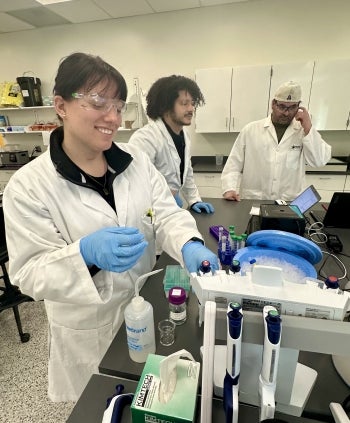ASU expands hands-on lab opportunities for online biochemistry students

ASU School of Molecular Sciences inaugural cohort of online students who came from across the country in the spring to conduct individualized analytical biochemistry laboratory experiments collaborate with one another and experience campus life. Photo courtesy Orenda Griffin
As a New York City autopsy research coordinator, Stephanie McQuillan saw her continued education as a gateway for career advancement.
Juggling full-time work in New York, McQuillan thrived in the flexible environment of Arizona State University’s online courses but was limited by when she could come to campus for her immersive in-person lab experience, traditionally only offered in the summer.
For the first time, ASU’s School of Molecular Sciences has expanded its analytical biochemistry hands-on laboratory opportunities for online students to be taken in the spring, summer and fall, with plans to expand further into additional nonmajor biochemistry lab offerings in the next academic year.
“I wanted to graduate as soon as possible to keep advancing my current career,” said McQuillan, who was part of the inaugural cohort of 16 ASU Online students who came from across the country to the Tempe campus in the spring to conduct individualized experiments, collaborate with one another and experience campus life.
“Coming to Arizona and taking my biochemistry lab in the spring was incredible; I'm now graduating earlier than I anticipated.”
The expanded offering of ASU’s Analytical Biochemistry Laboratory 467 is part of a pilot program that not only provides more flexibility for online students to take lectures and lab courses concurrently, but also includes a new redesign of course curriculum and implements new experiments that leverage ASU’s newly renovated modern laboratories.
“In addition to traditional instructional aspects, the new labs are designed to offer a research experience that otherwise would not be available for the online students,” said James Allen, professor in the School of Molecular Sciences who taught the spring lab and was involved in the redesign of the curriculum. “We’re not just offering more classes but seizing an opportunity and taking a fresh perspective on what has been done in the past.”
With hundreds of students in the biochemistry online program and growing, the School of Molecular Sciences plans to offer multiple sections of the course each semester, and to also start offering a nonmajors biochemistry lab course in the next academic year.
“This new initiative is a first step towards expanding the program beyond the constraints of summer, in service of the student’s needs and accommodating students’ differing career and employment requirements,” said Ian Gould, President's Professor in ASU’s School of Molecular Sciences and associate dean of online innovation in The College of Liberal Arts and Sciences.
“The School of Molecular Sciences and ASU are prepared to go to great lengths to make it as accessible as possible for students to earn their degrees. This (effort) is student focused to an extreme degree.”
More Science and technology

ASU and Deca Technologies selected to lead $100M SHIELD USA project to strengthen U.S. semiconductor packaging capabilities
The National Institute of Standards and Technology — part of the U.S. Department of Commerce — announced today that it plans to award as much as $100 million to Arizona State University and Deca…

From food crops to cancer clinics: Lessons in extermination resistance
Just as crop-devouring insects evolve to resist pesticides, cancer cells can increase their lethality by developing resistance to treatment. In fact, most deaths from cancer are caused by the…

ASU professor wins NIH Director’s New Innovator Award for research linking gene function to brain structure
Life experiences alter us in many ways, including how we act and our mental and physical health. What we go through can even change how our genes work, how the instructions coded into our DNA are…
